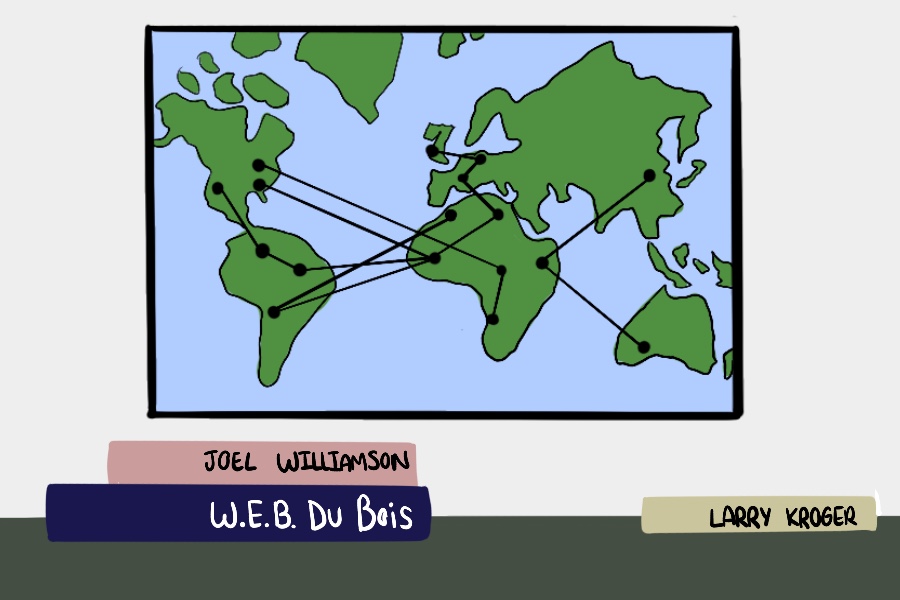Tracing buried roots: African American genealogy group works to recover forgotten histories
The African American History and Genealogy Study Group members share their own families experiences, discuss Black history and learn research tips from experts.
January 13, 2022
Growing up, Evanston resident Catherine Johnson would beg her mother and grandmother to tell her stories about their family.
But they didn’t tell her much. As a Black family that moved to Evanston during the Great Migration, their stories of coming north weren’t happy ones, she said, and her family didn’t typically share stories of times that had been difficult to live through.
Now, as a leader of Evanston’s African American History and Genealogy Study Group, Johnson has discovered some of the history her family never told her. She shares these stories with her children, grandchildren and great-grandchildren — the fifth generation of her family raised in Evanston.
“You need to know your history,” 80-year-old Johnson said. “If you don’t know your history, you don’t know your potential.”
Memories from the past can be painful and embarrassing, Johnson said, which means stories aren’t always passed down. Many African American families have lost their family history, she said, and for many in Johnson’s generation, Black history wasn’t taught in school.
The study group is trying to change that.
In 2008, founding member Mattie Amaker and her “girlfriends” invited a group of about eight into her living room to talk about genealogy.
“We’re just telling stories,” 88-year-old Amaker said. “And we just kept going, and it kept growing and growing … It was always interesting. And someone always had something to tell.”
The study group outgrew Amaker’s living room quickly. They have grown to about 30 members who now meet at the Levy Senior Center.
The group’s events vary month-to-month, Johnson said. Sometimes genealogy experts share research tips, and other times members discuss their own families’ experiences or a particular part of Black history. Members offer help to one another when they hit a brick wall in their research.
Johnson said the research process can be both tedious and thrilling.
“I’ve been up to three or four o’clock in the morning doing research on the computer,” Johnson said. “Once you get a hit, you don’t want to stop.”
One of the challenges of African American genealogy is the lack of historical documents. Group member Carole Boone said birth certificates are hard to find because many of their ancestors were born in rural areas, and finding documentation for enslaved ancestors can be almost impossible. Many records haven’t been digitized.
As a student in Evanston schools, Boone said she barely learned any African American history in class. Around sixth grade, she remembers asking her teacher when they would learn about African American history. The teacher sent her to the principal’s office. When she started school at Evanston Township High School in 1968, she and her friends staged sit-ins to protest the lack of Black history in their curriculum.
Now, learning about Black history in the U.S. is central to the study group. At meetings, they learn about Reconstruction, the Great Migration and other subjects they never studied in school.
“I don’t think you can really study genealogy unless you do the history,” Johnson said. “It helps you better understand your family, how they reacted and their values and the cultures that they had. It all intertwines together.”
Before the pandemic, the study group held community events, including a lecture series for Black History Month and a Kwanzaa celebration. While they’ve largely taken a hiatus for the past two years, the group recently applied for and received their first-ever grant. They plan to host a series of workshops for families to start researching their own lineage, tentatively named Evanston Family Sleuths Project.
Boone said she hopes their new initiative will inspire young people to study genealogy.
“One day my nieces and nephews will be telling their grandchildren, ‘Let me tell you about your great-great-great-grandmother, because this is what my great aunt told me,’” Boone said. “And if you can pass on those stories, then those people live. And they still live because we’re still telling their story.”
Email: [email protected]
Twitter: @luciabarnum_
Related Stories:
— Media experts discuss representation, diversity during event at Levy Center
— Shorefront awarded two-year grant for its preservation of the city’s Black history


